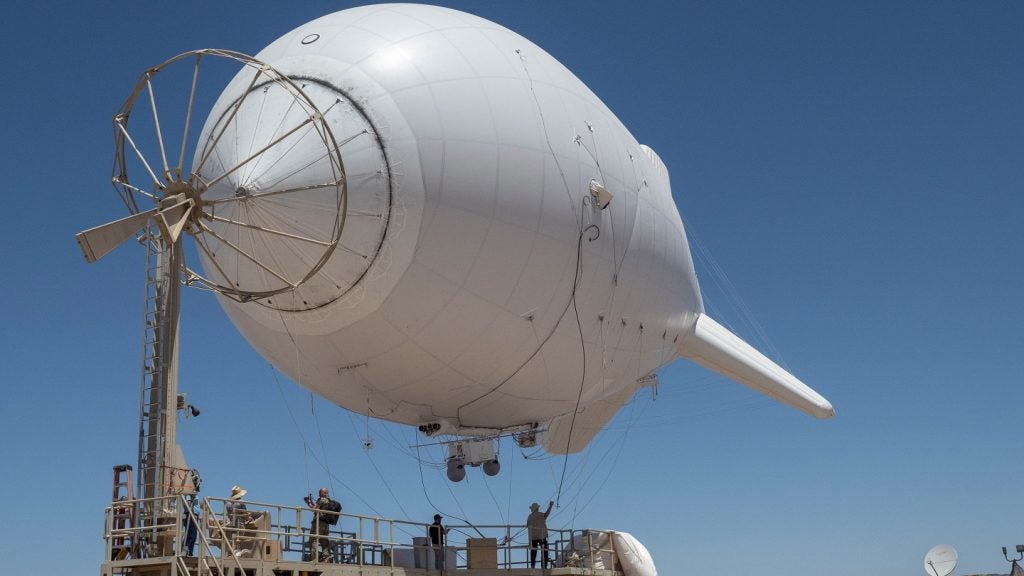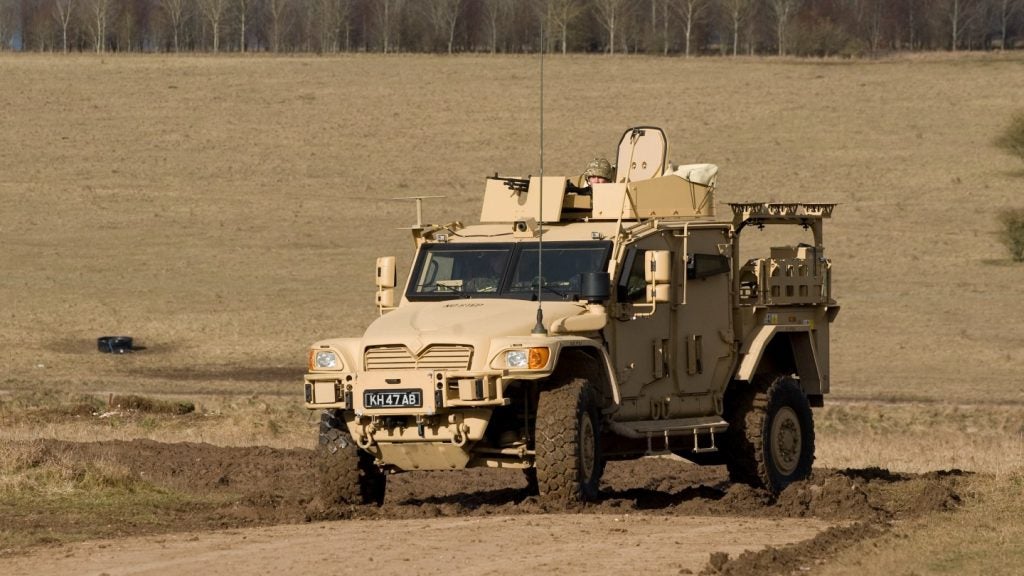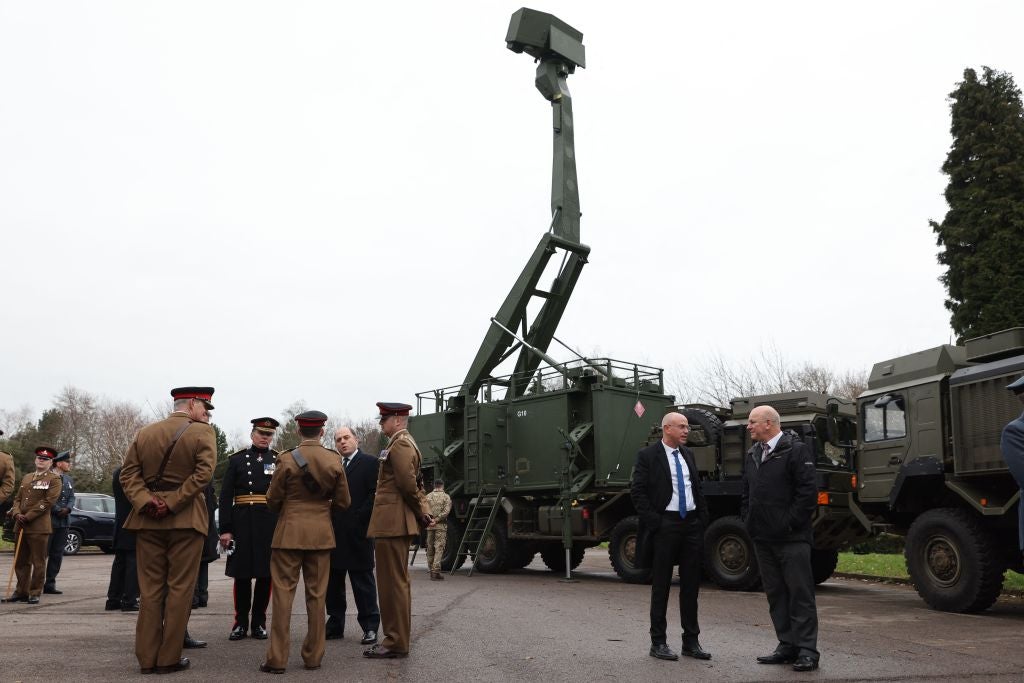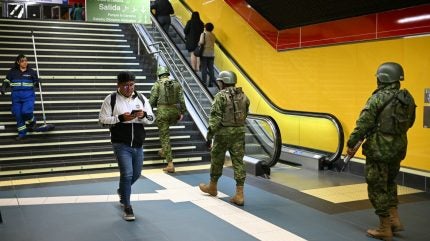
Ecuador’s state of emergency has reached breaking point.
On 22 April, news broke that Ecuadorian security forces had recaptured Fabricio Colón Pico Suarez, leader of the infamous Los Lobos gang partly responsible for months of unprecedented crime, prison massacres and the killings of prosecutors, judges and political candidates which have rocked the once relatively peaceful Andean nation.
How well do you really know your competitors?
Access the most comprehensive Company Profiles on the market, powered by GlobalData. Save hours of research. Gain competitive edge.

Thank you!
Your download email will arrive shortly
Not ready to buy yet? Download a free sample
We are confident about the unique quality of our Company Profiles. However, we want you to make the most beneficial decision for your business, so we offer a free sample that you can download by submitting the below form
By GlobalDataThe situation came to a head in January, when Colón Pico escaped from Riobamba prison amid a wave of violence across Ecuador, prompting President Daniel Noboa to declare a state of emergency and designate 22 criminal gangs as terrorist organisations.
Pico had also plotted to kill Ecuador’s attorney-general, Diana Salazar Méndez, a prominent figure in the crackdown on gang violence alongside Noboa.
Conflict has been rising in Ecuador since 2021. Last year, the murder rate quadrupled to approximately 8,000 violent deaths – one of which was the assassination of presidential candidate Fernando Villavicencio at a rally in the capital Quito.
Ecuadorians now wait with bated breath as the gangs decide how to respond to news of Colón Pico’s arrest.
Will Ecuador be given a long-overdue reprieve from months of uncontained murder and crime, or will the gangs retaliate in full force?
A referendum on military deployment
Ecuadorians appear to expect retaliation.
On 21 April, a majority of Ecuadorians voted in favour of allowing the military to patrol the streets of Cuenca, Santo Domingo, Quito and other cities, El Heraldo reported.
Guayaquil, a Pacific port city with the highest crime rates in Ecuador, is expected to be the military’s primary target.
The referendum also saw Ecuadorians vote for longer prison sentences and the extradition of violent criminals.
Any potential retribution by the gangs is predicated on how Colón Pico is reintegrated into the prison system, according to Glaeldys González Calanche, fellow for Latin America with the International Crisis Group.
“I do not expect any retaliation from criminal groups upon Colón Pico’s return to a prison in Ecuador unless his presence disrupts the established power dynamics within the prison,” Calanche tells Army Technology. “Such disruptions have previously led to unrest both inside and outside the prison facilities.”
Even as Ecuadorians headed to the polls, Cosme Damian Parrales Merchan, director of Ecuador’s SNAI prison agency, was killed in an attack.
Several mayors have also been murdered by gangs such as Los Lobos and Los Choneros in recent months.
International attention to Ecuador’s crisis peaked during the armed hold-up of state broadcaster TC Televisión’s studio in Guayaquil in January.
Live coverage of the gangs’ hostage-taking was broadcast around the country and world, while seemingly coordinated attacks took place across hospitals, businesses and universities.
Such levels of armed violence mean most Ecuadorians no longer leave home unless necessary.
Emigration levels to the US and elsewhere have reached record highs, despite fleeing Ecuadorians having to cross the perilous Darien Gap along the Colombia-Panama border.
Is Noboa’s turn to the ‘Bukele model’ justified?
Opinions have been divided on how Noboa and the Ecuadorian military should respond.
Isabel Chiriboga, assistant director at Atlantic Council’s Latin America Centre, who believes military intervention is “necessary at this point in time”, but is “also not viable in the long run”.
“The gangs had taken control of the prison system, which had become command and control centres for criminal operations,” Chiriboga tells Army Technology.
“During these interventions, the armed forces confiscated thousands of weapons, bombs, drugs, cell phones, broadband equipment facilitating external communications, explosives, and other highly lethal and illegal items that should never have been in the prisons.”
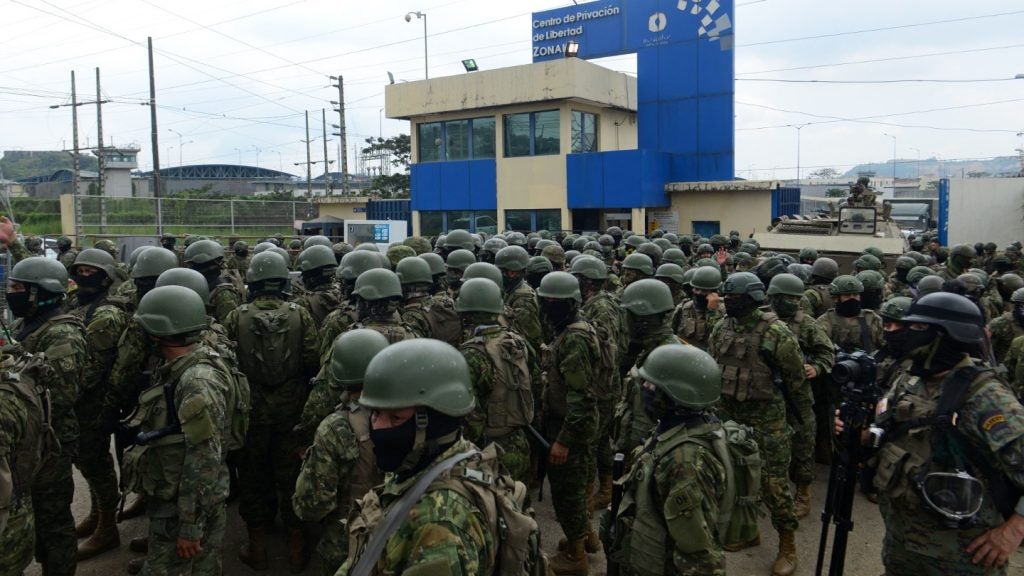
Chiriboga also points to leadership decapitation, an effective tactic often used against terrorist organisations.
“The best approach to avoid any further escalation is for the armed forces to closely collaborate with international intelligence to develop coordinated operations targeting the leaders of criminal gangs”, Chiriboga says.
“Ultimately, most of the people who are currently in jail do not operate in a silo; they are direct respondents to the well-thought-out operations of criminal leaders. For Ecuador to continue advancing its security approach, it is necessary to target both the leaders of these organisations, their sources of financing and the intellectual authors of crimes.”
The political imperative for Noboa to loosen the gangs’ stranglehold over the prisons is clear. Ecuadorian prosecutors said that Villavicencio’s assassination, for instance, was planned from prison.
But the recent referendum has raised concerns about a pivot from Noboa’s government towards a ‘mano dura’ or ‘iron fist’ approach taken by countries such as El Salvador.
Like El Salvador’s self-described “world’s coolest dictator” Nayib Bukele, Noboa has commissioned new maximum security and supermax prisons, if not yet pursued the same weakening of democratic processes.
But Noboa will have recognised the popularity (and brutality) of Bukele’s methods.
Human rights organisations have warned of false imprisonment in El Salvador, where the walls of Bukele’s so-called ‘mega-prison’ have been lined with alleged gang members, sometimes without due process.
Decades of warfare between armed forces, narco groups and guerrilla fighters in Colombia further illustrate why an initial military crackdown can be shortsighted and result in cyclical conflict.
“There are equally important longer-term reforms that could provide sustained relief from insecurity,” says Calanche.
“These include strengthening the judicial system and focusing on crime prevention. The goal for Ecuador should be to create an environment where criminal groups perceive more disadvantages than advantages in committing acts of violence.”
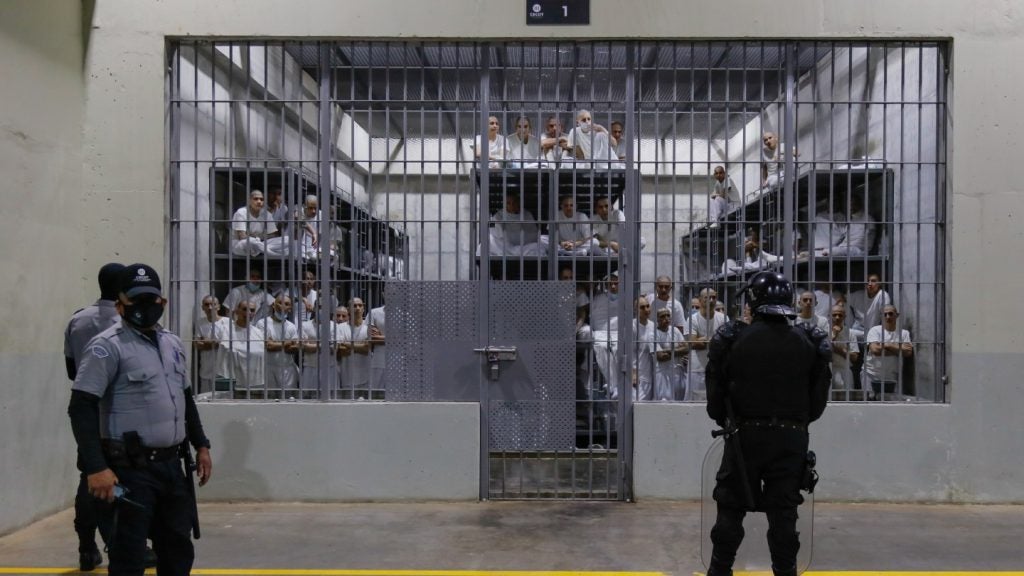
For Ecuador, tackling the violence without the presence of US troops will be imperative.
In a continent where US intervention and occupation still influence much of the regional psyche, Washington’s infamous ‘Operation Condor’ is still front of mind.
Ecuador was one of eight South American countries (alongside Argentina, Bolivia, Chile, Paraguay, Uruguay, Brazil and Peru) joined by a US-backed network of military dictatorships which oppressed, kidnapped and killed left-wing dissidents and political figures.
But Calanche warns that Ecuador’s current approach is likelier to reunite gang members and increase the pressure to call for foreign assistance.
“The current security policy has primarily focused on dismantling gangs, leading to the arrest of over 10,000 individuals in the past three months,” Calanche tells Army Technology.
“However, the strategy of mass incarceration, could inadvertently bolster the ranks of groups within prisons, the centres of operations for criminal groups. This could paradoxically end up empowering the gangs and could ultimately lead to a much more critical situation.”
Why Ecuador?
Ecuador was once merely a transit route for Peruvian coca to reach Colombia.
A country known for peace, dollarisation – and the Galapagos Islands – Ecuador did not suffer the drug violence of its neighbours, but has somehow become one of Latin America’s primary cocaine dispatch points.
Geography is key. Ecuador is sandwiched between Colombia and Peru, the two largest coca producers in the world.
Following decades of conflict between Colombian security forces and drug cartels, as well as the Farc rebel group’s demobilisation in 2016, a vacuum was left in South American smuggling routes.
Mexican cartels and criminal groups from the Balkans have filled this vacuum. Ecuador’s 22 designated gangs have connections to these international syndicates, including the Sinaloa Cartel, Jalisco Nueva Generación Cartel and Albanian mafia.
“These groups capitalised on Ecuador's strategic location between Colombia and Peru and its easy access to the Pacific Ocean”, Chiriboga tells Army Technology. “The removal of the US Navy base in Manta in 2016 diminished surveillance over illegal activities in the Pacific, providing a gateway for these groups to transport illegal goods through Ecuador to global markets.”
Bananas and dollars are also key factors.
Ecuador is the world’s leading banana exporter, accounting for 33% of global trade in a commodity which has become synonymous with cocaine smuggling, local investigations have found.
Ecuador exports a weekly average of 5,500 to 6,000 containers of bananas from the Port of Guayaquil, DP World Posorkja, Naportec, Port Bolívar and others.
These deals are conducted within an economy which switched from the Ecuadorian sucre to the US dollar in 2000.
Aside from stability, a dollarised economy also means more profitable transactions for drug cartels compared to, for example, the Colombian peso ($1 equates to roughly 3,900 pesos).
The post-pandemic downturn in Ecuador’s economy has also been a factor, according to Chiriboga.
“Many Ecuadorians lost their jobs and became desperate for better opportunities”, she tells Army Technology. “In such vulnerable times, criminal gangs offer employment and financial incentives, simultaneously fostering corruption and bribery within state institutions.”
Calling on the military in a Bukele-style caudillo (hardman) clampdown holds obvious temptations for Noboa, who became Ecuador’s youngest-ever president when he gained office a few months ago.
But for Ecuador to return to long-lasting peace, any step-up in military responsibilities must be paired with a raft of reforms pursuing social connectedness and economic opportunity.



